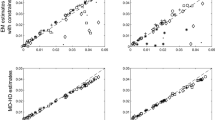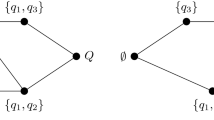Abstract
To capture the cognitive organization of a set of questions or problems pertaining to a body of information, Doignon and Falmagne have proposed, and analyzed in a number of papers, the concept of aknowledge space, that is, a distinguished collection of subsets of questions, representing the possibleknowledge states. This collection of sets is assumed to satisfy a number of conditions. Since this concept is a deterministic one, the problem of empirical testing arises. A stochastic version of a knowledge space is developed in this paper, in which the knowledge states are considered as possible epochs in a subject's learning history. The knowledge space is decomposed as a union of a number of possible learning paths, calledgradations. The model specifies how a subject is channelled through and progresses along a gradation. A probabilistic axiom of the “local indepencence” type relates the knowledge states to the observable responses. The predictions of this model are worked out in details in the case of parametric assumptions involving gamma distributions. An application of the model to artificial data is described, based on maximum likelihood methods. The statistical analysis is shown to be capable of revealing the combinatoric core of the model.
Similar content being viewed by others
References
Birkhoff, G. (1937). Rings of sets.Duke Mathematical Journal, 3, 443–454.
Chandler, J. P. (1969). STEPIT: Finds local minima of a smooth function of several parameters.Behavioral Science, 14, 81–82.
Degreef, E., Doignon, J.-P., Ducamp, A., & Falmagne, J.-C. (1986). Languages for the assessment of knowledge.Journal of Mathematical Psychology, 30(3), 243–256.
Doignon, J.-P., & Falmagne, J.-C. (1985). Spaces for the assessment of knowledge.International Journal of Man-Machine Studies, 23, 175–196.
Falmagne, J.-C., & Doignon, J.-P. (1988a). A Markovian procedure for assessing the state of a system.Journal of Mathematical Psychology.
Falmagne, J.-C., & Doignon, J.-P. (1988b). A class of stochastic procedures for the assessment of knowledge.British Journal of Mathematical and Statistical Psychology.
Johnson, N. L., & Kotz, S. (1970). Distributions in statistics. Continuous univariate distributions, 2. New York: Houghton Mifflin.
Lord, F. M., & Novick, M. R. (1974). Statistical theories of mental test scores (2nd. ed.). Reading, MA: Addison Wesley.
Monjardet, B. (1979). Tresses, fuseaux, préordres et topologies.Mathématique et Sciences Humaines, 30, 11–22.
Parzen, E. (1960).Modern probability theory and its applications. New York: John Wiley & Sons.
Peizer, D. B., & Pratt, J. W. (1968). A normal approximation to the binomial, F, beta, and other common, related tail probabilities I.Journal of the American Statistical Association, 63, 1416–1456.
Pratt, J. W. (1968). A normal approximation in the binomiaal, F, beta, and other common, related tail probabilities II,Journal of the American Statistical Association, 63, 1457–1483.
Villano, M., Falmagne, J.-C., Johannesen, L., & Doignon, J.-P. (1987). Stochastic procedures for assessing an individual's state of knowledge. Proceedings of the International Conference on Computer Assisted Learning in Post-Secondary Education (pp. 369–3711). Calgary, Canada.
Author information
Authors and Affiliations
Additional information
This work was supported by NSF grant IST-8418860 and ARI grant DAAG29-84-G-0083 to New York University. I am grateful to Jean-Paul Doignon, Mathieu Koppen, Geoff Iverson and Michael Landy for their reactions to previous drafts of this paper, to Michael Villano for carrying out the computer simulation and the analysis of the simulated data, and especially to one referee for his very useful comments.
Rights and permissions
About this article
Cite this article
Falmagne, KC. A latent trait theory via a stochastic learning theory for a knowledge space. Psychometrika 54, 283–303 (1989). https://doi.org/10.1007/BF02294521
Received:
Revised:
Issue Date:
DOI: https://doi.org/10.1007/BF02294521




